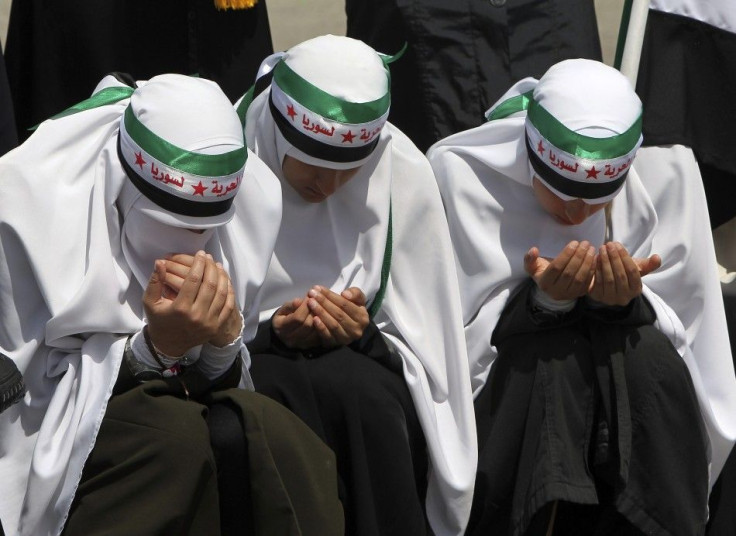Syrian Violence Worsens As Ceasefire Deadline Approaches

Four days before a ceasefire is supposed to begin, Syrian forces have stepped up their campaign to crush dissidents, sending more tanks, snipers and gunship helicopters into opposition towns and cities.
Clearly, the violence is still continuing, said special United Nations-Arab League envoy Kofi Annan, who drafted the ceasefire agreement. Alarming levels of casualties and other abuses continue to be reported daily. Military operations in civilian population centers have not stopped.
In advance of the April 10 deadline to being withdrawing troops, President Bashar al-Assad seems determined to crush the opposition and reclaim rebel held towns. A number of areas in the northern Idlib province have been shelled to the ground, according to activists, and the siege on the cities of Homs and Damascus continues.
Helicopters started hitting the streets with machine guns, firefighter and refugee Ahmad Zakzak, who was trying to find his daughter in the northern village of killi, told Reuters. I escaped from my car and a young guy on a motorcycle helped me. I jumped on with him only to see a tank in front of us. It fired a shell in our direction and he was killed instantly.
I could not recognize Killi. The roads were full of rubble. Shells were hitting everywhere, he said.
The increase in violence has diminished hope that Assad is going to adhere to Annan's plan as promised. Despite withdrawing troops from some calm cities earlier in the week,the government is putting the onus on rebel fighters, insisting that they must stop their attacks first.
Can we be optimistic? I am not. French Foreign Minister Alain Juppe said in Paris. I think Bashar Assad is deceiving us.
In rebuttal, the Syrian government said on Friday that the U.N. Human Rights Council is ignoring the armed terrorists being funded from abroad. Throughout the year of violence in Syria, Assad has blamed terrorist gangs for the unrest, protests and the deaths of more than 6,000 Syrian citizens, and the regime now attests that UN High Commissioner for Human Rights Navi Pillay's assessment of the situation is unfair.
[Pillay's] bias against Syria has become evident as she turns a blind eye to terrorism targeting the Syrian people at the hands of armed groups with an external funding, the foreign ministry said in a letter.
Last month, Pillay told the BBC that there was enough evidence to charge Assad with human rights violations, including the use of heavy weapons against civilians and soldiers targeting children. But the government insists that the human rights commissioner disregards the ample evidence of crimes against humanity perpetrated by the armed groups and has chosen instead to compile lies and fabrications and market them as if they were facts without bothering to verify them.
On Friday, Syria's official SANA news agency reported that 11 soldiers and police officers who had been killed during the conspiracy hatched against the homeland were buried in the Damascus countryside.
Solemn processions were held for the martyrs who were targeted by armed terrorist groups while on duty in Homs, Damascus, Aleppo, Idleb and Damascus, SANA said.
As the violence in Syria increases, so does the number of refugees fleeing the country. On Thursday alone, close to 3,000 people fled from Idlib province into Turkey, where the government has constructed new refugee camps, and another 1,000 are expected to arrive on Friday. As they have been for weeks, Syrian forces are trying to prevent border crossings and have been shooting anyone trying to traverse the Orontes River, Reuters reported.
Turkey, which has been a vocal critic of Assad since the uprising began, is pushing for other nations to come to the aid of refugees, and the county's foreign minister told UN Secretary General Ban Ki-moon on Thursday that the international body needs to take a more active role before the situation degrades further.
Our doors have always been open to people who are leaving their houses, homelands and villages and coming to our country to protect their lives, however the international community should also see this fact, Foreign Minister Ahmet Davutoglu told the Journal of Turkish Weekly.
Preempting Davutoglu's comments, Kuwait donated $1 million to the U.N. High Commissioner for Refugees on Thursday to aid the 130,000 Syrians who have fled the country.
“This assistance comes in the framework of the keenness of Kuwait to provide assistance and humanitarian aid to Syrian refugees who are in neighboring countries, Turkey, Lebanon and Jordan, Kuwait's Ambassador to the U.N., Mansour Al-Otaibi, stated.
© Copyright IBTimes 2024. All rights reserved.




















